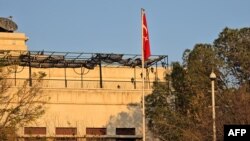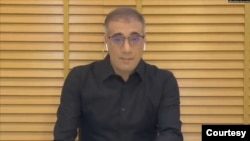
In the final days leading to his ouster, Syrian President Bashar al-Assad complained to Iran's foreign minister that Turkey was actively supporting Sunni rebels in their offensive to topple him, two Iranian officials told Reuters this week.
Five decades of rule by Assad's family ended Sunday when he fled to Moscow, where the government granted him asylum. Iran had backed Assad in Syria's long civil war, and his overthrow was widely seen as a major blow to the Iran-led "Axis of Resistance," a political and military alliance that opposes Israeli and U.S. influence in the Middle East.
As rebel forces from Hayat Tahrir al-Sham, or HTS, formerly aligned to al-Qaida, seized major cities and advanced toward the capital, Assad met Iranian Foreign Minister Abbas Araghchi in Damascus on December 2.
At the meeting, Assad voiced anger over what he said was Turkey's intensified efforts to unseat him, according to a senior Iranian official. Araghchi assured Assad of Iran’s continued support and promised to raise the issue with Ankara, the official said.
The next day, Araghchi met with Turkish Foreign Minister Hakan Fidan to express Tehran’s deep concerns over Ankara’s support for rebel advances.
"The meeting was tense. Iran expressed its unhappiness with Turkey's alignment with U.S. and Israeli agendas and conveyed Assad's concerns," a second Iranian official said, referring to Ankara's support for rebels and cooperation with Western and Israeli interests in targeting Iran's allies in the region.
Fidan, the official said, blamed Assad for the crisis, asserting that his failure to engage in genuine peace talks and his years of oppressive rule were the root causes of the conflict.
A Turkish Foreign Ministry source familiar with Fidan's talks said that those were not the exact remarks by Fidan and added that Araghchi did not bring and convey any messages from Assad to Turkey, without elaborating.
Fidan told reporters in Doha, Qatar, on Sunday that the Assad regime had "had precious time" to address Syria's existing problems but did not, instead allowing "a slow decay and collapse of the regime."
Iranian Supreme Leader Ayatollah Ali Khamenei said Wednesday that Assad's toppling was the result of a plan by the United States and Israel.
He said that one of Syria's neighbors also had a role and continues to do so. He did not name the country but appeared to be referring to Turkey.
NATO member Turkey, which controls swathes of land in northern Syria after several cross-border incursions against the Syrian Kurdish YPG militia, was a main backer of opposition groups aiming to topple Assad since the outbreak of the civil war in 2011.
Assad's downfall stripped Iran and the Lebanese group Hezbollah of a vital ally. Tehran's ties to Damascus had allowed Iran to spread its influence through a land corridor from its western border via Iraq all the way to Lebanon to bring arms supplies to Hezbollah.
Iran spent billions of dollars propping up Assad during the war and deployed its Revolutionary Guards to Syria to keep its ally in power.
Hezbollah also played a major part, sending fighters to support him, but had to bring them back to Lebanon over the last year to fight in a bruising war with Israel — a redeployment that weakened Syrian government lines.







